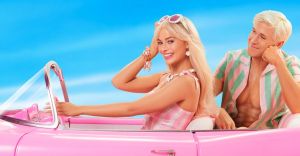
Barbie
Barbie Review
Welcome to a world both familiar and freshly spun, where pink is more than a color—it's a statement. "Barbie," directed and co-written by indie darling Greta Gerwig, takes us through the sparkly corridors of a toy universe that has captivated generations. But this isn't just another tale spun from a cherished childhood memory; it's a reimagining that packs as much wit as it does whimsy.
From the moment the screen floods with a cornucopia of hues, audiences are whisked away into the heightened reality of Barbieland—a place where perfection is currency and fun is the prime directive. Margot Robbie embodies the titular character, serving not only a visual homage to the iconic doll but also a nuanced performance that straddles the lines between fantastical and earnest.
Yet, "Barbie" isn't content with merely skating on the surface of its reflective sheen. It delves deep, seeking to uncover and understand the implications of the near-mythic role this cultural staple plays in the larger social fabric. In this introduction to Gerwig's glossy universe, we're teased with what promises to be a ride of laughter, satire, and heart—a plastic-fantastic spectacle with an intellectual edge.
Riding the Rollercoaster of Nostalgia and Novelty
The world crafted by Gerwig and her team is nothing less than awe-inspiring. The product of Oscar-caliber work from the likes of Jacqueline Durran (costume design) and Sarah Greenwood (production design), the film offers a visual pantheon that demands multiple viewings. Rodrigo Prieto's cinematography bathes each scene in the kind of glow befitting Barbie's unyielding positivity.
Yet, "Barbie" is not without its hiccups. In its ambition to reach for the stars, it occasionally stumbles over its gold-laced shoestrings. The mid-section of the film, though structurally essential, becomes mired in an attempt to shoulder the weight of its more substantial themes. Gerwig's admirable swing at interlacing heavier subjects into a frothy summer cocktail sometimes dilutes the effervescent fun that characterizes the film's opening. The third act, especially, is imbued with almost didactic moments that, while undoubtedly profound, can feel more like a lecture than a natural progression of the narrative.
Despite these missteps, "Barbie" remains consistently anchored by Robbie's incredible ability to morph from the plastic surface of a doll into a multifaceted character with depth. Gosling, too, delights as Ken, dodging any allergic reactions to shared screen chemistry while providing a masterclass in comic timing.
The supporting cast is a treasure trove of talent, each adding a unique sparkle to this already shimmering tapestry. While the story boldly navigates from big laughter to pensive quiet, it sometimes loses the brisk pace that defined its earlier charm. Not every scene threads the needle of self-awareness with the same deftness, leaving some viewers to wonder if the escapade could have benefitted from a trim of excess narrative frills.
The Audience Walks the Pink Carpet
At the closing credits of "Barbie," what resonates with its audience is a collective sense of being part of something groundbreaking. Viewer impressions swing from one end of the spectrum to the other—some adoring the irreverent take on a pop culture phenomenon, while others find its tonal shifts jarring. However, the majority seem to walk away with a newfound appreciation for the depth and conversation that "Barbie" inspires post-viewing, initiating dialogues about femininity, self-acceptance, and societal norms.
The film, though not without its weaker moments, unlocks a multitude of perspectives under its glittery facade. Whether it's a nod of understanding from those who feel seen by its more serious commentaries or chuckles elicited from its comedic acuteness, "Barbie" manages to be more than its pieces—a toy turned testament to the endless possibilities of reinvention.
For most, "Barbie" is the cinematic equivalent of a surprise inside an expected package—an entertaining ride that simultaneously sneaks in substantial food for thought. A confectionary concoction of social commentary dipped in a vibrant candy coating, Greta Gerwig's "Barbie" emerges as a cinematic polymath that teaches as much as it tickles.




